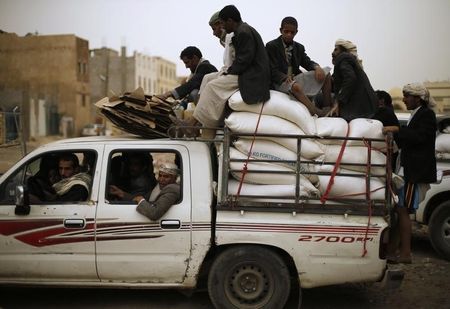By Maha El Dahan
ABU DHABI (Reuters) - An escalation of political turmoil in Yemen, one of the poorest countries in the world, risks aggravating an already dire food security situation, the United Nations Food and Agriculture Organization (FAO) said on Monday.
Shi'ite Muslim rebels seized the Yemeni capital Sanaa this month, prompting President Abd-Rabbu Mansour Hadi to warn of a drift towards civil war in a country long riven by deep political, religious and tribal divisions.
One in four Yemenis is undernourished and more than half of Yemen's 25 million people are 'food insecure', that is lacking access to sufficient food for their needs, FAO regional coordinator Ad Spijkers told a news conference in Abu Dhabi.
With a high proportion of the population living off the land and some 90 percent of Yemen's water resources being used in agriculture, people are especially vulnerable when conflicts disrupt farm production, FAO officials said.
"In every effort to improve food security and nutrition you need stability and in Yemen two thirds of the population depend on agriculture," said Spijkers.
"So if people are displaced and they can't grow food for their own families then there is a very severe situation."
Compounding Yemen's plight, nearly half of its irrigation water goes to growing qat, a narcotic leaf that fetches a high price on local markets, rather than to growing staple crops.
The cash-strapped government has to import 90 percent of the wheat and 100 percent of the rice it needs to feed its people.
This heavy reliance on global food markets, coupled with dwindling foreign exchange as a result of a slump in oil exports, are now both aggravating Yemen's food vulnerability, FAO said.
POLITICAL INSTABILITY
Yemen earned just $671 million (413.13 million pound) from exporting crude oil in January-May, down nearly 40 percent from a year earlier, as a result of frequent bombings of its oil and gas pipelines, mostly by disgruntled tribesmen feuding with the state.
The FAO's Yemen representative, Salah Elhajj Hassan, told Reuters by telephone from Sanaa on Monday that Yemen's conflicts were hampering even the most basic aid programmes such as distributing agricultural inputs to farmers in rural areas.
"As we speak we are trying to send some assistance to Jawf province but we have a problem doing that because of the severity of the situation there," he said.
As well as the violence in Sanaa, Yemen also faces regular attacks by al Qaeda - most recently on Sunday when a suicide bomber killed at least 15 people - and protests by southern separatists demanding secession from the country.
Instability in Yemen is a worry for the United States and its Gulf Arab allies because of its position next to Saudi Arabia and shipping lanes which run through the Gulf of Aden.
FAO has been working with international donors to help modernise Yemen's agricultural sector and around 40 projects have been identified in the past two years.
"Some of these projects have seen the light after being selected by various donors but the current situation in Yemen ... is hampering progress on the ground and donors will only add more if they see results," said Sirelkhatim Mohamed, a FAO investment officer working on the issue.
Yemen's National Food Security Strategy, set up as a response to a spike in global food prices in 2008, aimed to cut food insecurity by a third by 2015 and to make 90 percent of the population food secure by 2020.

But the strategy, which included plans to set up a strategic grain reserve, has been severely hampered by the instability plaguing Yemen since street protests ousted former president Al Abdullah Saleh in 2011, a recent FAO report on the country said.
(Reporting By Maha El Dahan; editing by Sami Aboudi and Gareth Jones)
